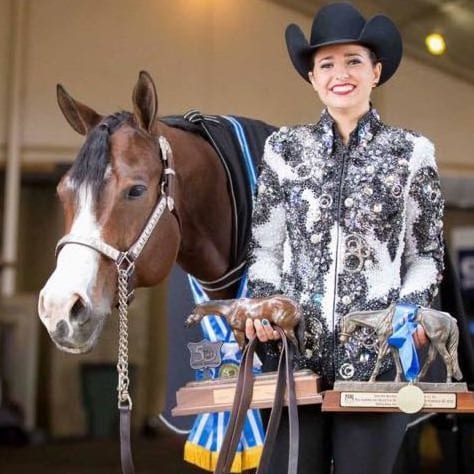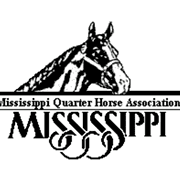Often, champion riders look like they have nerves of steel or ice water running through their veins. They seem to have an innate confidence in themselves. While they may be born with that self-assurance, riders with the right mental and physical training can develop these positive traits.
In the show ring, some of us get more nervous than others. When watching the toughest classes in the show industry, viewers may have the impression that consistent winners are always calm and in control. However, this is not always the case. So, how do they overcome their doubts to always rise to the occasion?
We spoke with several elite exhibitors about how they mentally prepare for high stakes classes.
Nerve Block
A 2016 Youth Congress Champion, Cori Cansdale of Laguna Beach, California admits to being nervous before big shows, but she has created a successful method in dealing with her anxieties.
“The night before I show, I always bring home my patterns for the following day, just to review and study a little more. I don’t usually get nervous the night before, but I do the morning of the show. I head to the barn early to get mentally prepared. To calm my nerves, I listen to music in the car with my mom on the way to the fairgrounds.”
She adds, “A lot of positive comments from my mom, friends, and of course, my trainer, give me the confidence I need to show. As soon as I get up to the cone, my nerves are gone.”
 Fellow youth competitor, Bella Rosa (pictured left) of Livermore, California saw her share of victories in 2016 at the All American Quarter Horse Congress. Perhaps her calm nature in the show pen comes from years as a pitcher playing competitive softball.
Fellow youth competitor, Bella Rosa (pictured left) of Livermore, California saw her share of victories in 2016 at the All American Quarter Horse Congress. Perhaps her calm nature in the show pen comes from years as a pitcher playing competitive softball.
“I still get nervous but not nearly as much as I used to,” Rosa admits. “I have learned to visualize the patterns in my head before I go to sleep the night before a big class. Then, in the morning, I focus on staying calm, both off and on my horse. I do not want to transfer my nervous energy to him (One Dynamic Krymsun).”
Reserve Congress Champion Amateur exhibitor, Libby Rinder is no newbie to the winner’s circle. Hailing from Connecticut, Rinder states that the large shows like the Congress and World Show are where she feels the most pressure.
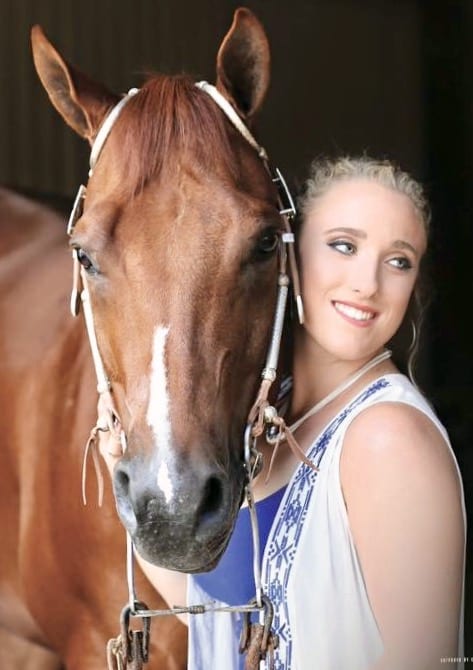 “I think that’s because you have one shot to go out and have a great ride. At other shows, I compete in each class at least twice; so I go in with the mentality that if something doesn’t go great, I can make an effort to fix it. Then, I have a second or sometimes third and fourth chance to have a great ride.”
“I think that’s because you have one shot to go out and have a great ride. At other shows, I compete in each class at least twice; so I go in with the mentality that if something doesn’t go great, I can make an effort to fix it. Then, I have a second or sometimes third and fourth chance to have a great ride.”
Rinder (pictured right) does admit, “I’m usually the most nervous the night before a big class when I have nothing but time to think about the ride. On the morning of the competition, I try and stay busy and focused and not think about all of the ‘what ifs.’ In the warm up pen, I just try and remain focused on what I need to do to prepare myself and my horse.”
Professional trainer, Pasley Puthoff of Purcell, Oklahoma, always appears to have it together. Working for futurity trainers, Angie and Charles Cannizzaro, has allowed her to compete at the toughest level with some very high-pressure stakes.
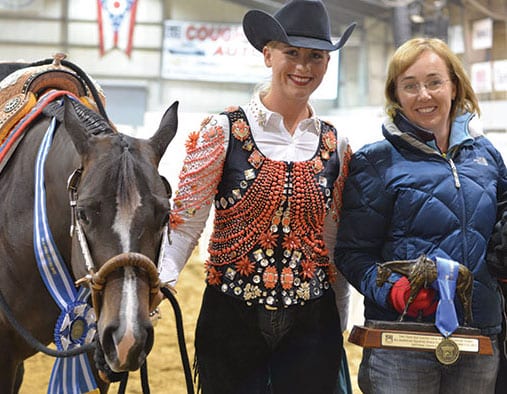 Puthoff (pictured left) describes her game plan for these situations. “Before a big important class, I think there is always a level of anxious tension. With the amount of time and preparation we put into it, I want it to all go well. I always try to put that energy towards my preparation. For example, I will go over a general checklist in my mind to prepare the horse and myself to show at our best.”
Puthoff (pictured left) describes her game plan for these situations. “Before a big important class, I think there is always a level of anxious tension. With the amount of time and preparation we put into it, I want it to all go well. I always try to put that energy towards my preparation. For example, I will go over a general checklist in my mind to prepare the horse and myself to show at our best.”
Similarly, Adam Mathis, a trainer at Gil Galyean Quarter Horses, also challenges his tensions with an agenda. The NSBA World Champion turns his anxiety into positive pressure. “I love it!” Mathis claims with enthusiasm. “I get nervous, but it is a good nervous. I try not to let the pressure get to me. Since I treat every class like it is a big, tough class, my routine rarely changes. That way, I can maintain a feeling of control and be ready to rock and roll.”
The Brain Game
Even the most highly decorated and confident of players have moments of self-doubt. However, consistent winners think effectively when facing this problem.
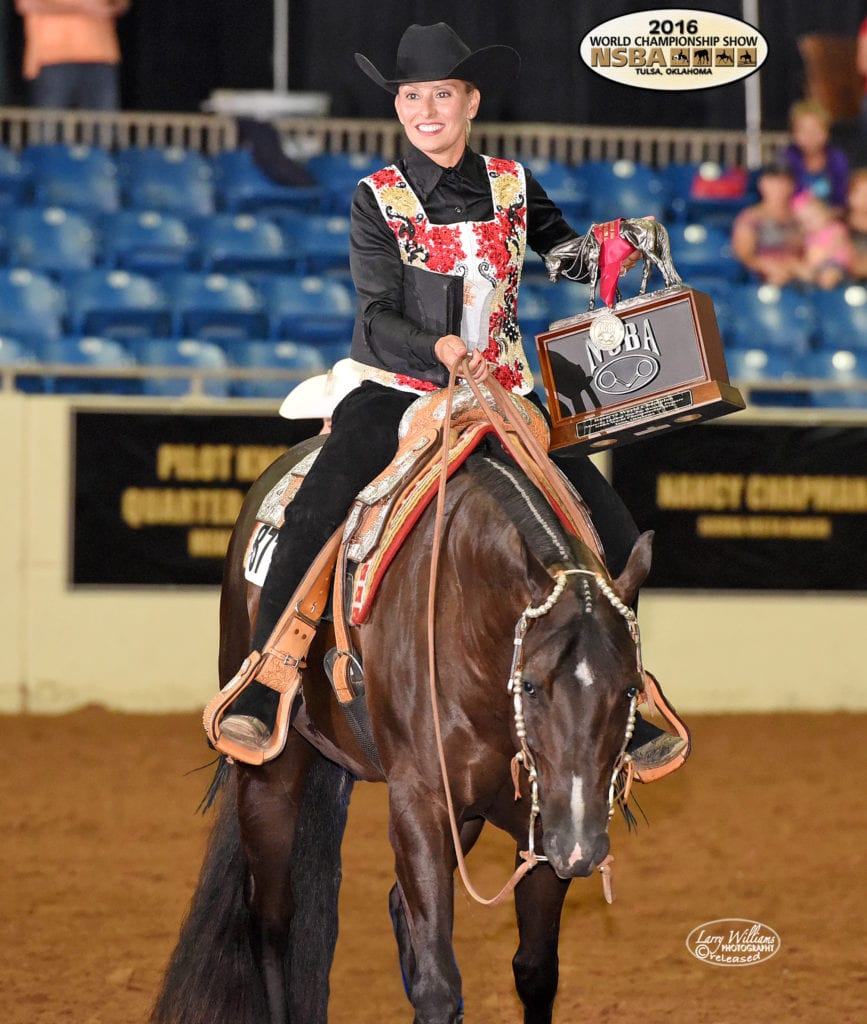 Amateur, Amy Mackie-Smith (pictured right), who owns the stallion, Iron Enterprise, along with her husband, Kevin Smith, admits to having a lack of self-confidence occasionally. “Like everyone, I do have moments where I question myself and the decisions that I made in the pen, but I try not to beat myself up about it. At the time, it seemed like the right decision even if it wasn’t. Hindsight is always 20/20.”
Amateur, Amy Mackie-Smith (pictured right), who owns the stallion, Iron Enterprise, along with her husband, Kevin Smith, admits to having a lack of self-confidence occasionally. “Like everyone, I do have moments where I question myself and the decisions that I made in the pen, but I try not to beat myself up about it. At the time, it seemed like the right decision even if it wasn’t. Hindsight is always 20/20.”
Cansdale agrees, “I try to think of every time I show as a different run. You can go into a class straight after messing up a go and do amazing. If you focus on what you messed up on in the past, chances are you’ll mess up again, so I just try to live in the now.” Her mantra is “Try and make this ride better than your last.”
Rinder uses her support system and her trainer, Whitney Lagace, for guidance in weak moments. She also takes time by herself for her mental reboot. “I like to go off on my own with my horse and just work on my partnership with him/her, even if it’s just for a 10 minute, relaxed ride. When I get to the point where I feel like we are working as a team, that’s when I get into the best mind frame.”
Mackie-Smith augments, “My favorite saying is ‘it is what it is.’ To me, there is no sense in wasting time and effort on a bad ride or even on a good ride where you felt you should have placed higher. You can’t worry about what you can’t control. All you can do is focus on what will make your next ride better. I always tell my daughter, Paige, that it doesn’t matter if you win the Congress or get cut from your split, you still have to clean your stalls in the morning.”
Taking time for herself is also important to Bella Rosa. “I refocus my brain by thinking about the positive parts of whatever it was that went wrong, whether it be a class or even just practice. Sometimes for me, reminding myself why I started this sport helps me overcome bad days.”
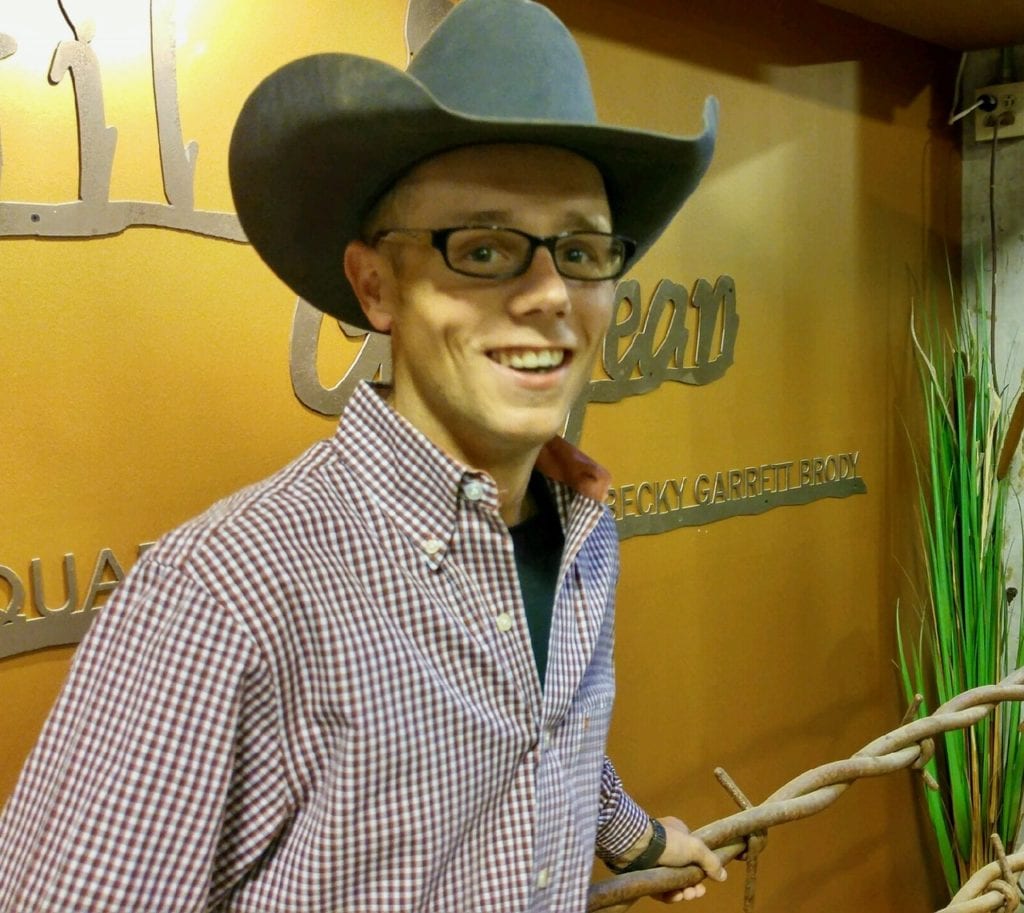 As for the up and coming trainers, they like to turn to their mentors and center their thoughts.
As for the up and coming trainers, they like to turn to their mentors and center their thoughts.
“When I have self-doubt, I try to remember for every two good days, I have a bad day,” Mathis explains. “In that moment, I like to return to my fundamentals, focus on the positive and break the problem down. Then, I can correctly attack it in a better way.”
Puthoff concurs, “When I get stuck in a spot with a horse, sometimes I will start to doubt my ability. That’s when I turn to a fellow respected horse trainer. I will explain to them the problem I’m having and they always give me great advice. They remind me that the uncertainty is a growing experience. I live by the quote, ‘Those who work hard tend to be lucky.’ It’s simple, but something I truly believe in.”


